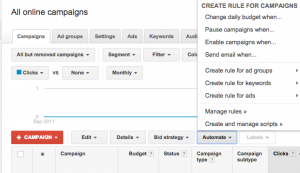As social platforms gained popularity, the issue that lingered for years was how they would make money by capitalizing on the networks that had been developed and widely adopted by brands and consumers alike. Advertising seemed like the answer, and all things pointed to a shift from organic reach to paid platforms. With algorithm updates like Facebook Zero, which slashed brands’ organic reach, it’s gotten harder for their messages to be seen by even those who have opted in. The writing was on the Facebook wall, and social media platforms turned into pay-to-play arenas where brands must advertise to survive.
If we step back and evaluate the social marketing landscape from a high level, we have to ask ourselves, are we really that surprised about this transition? And better yet, how do these changes affect consumers’ perception of brands’ place on social media?
Big companies like Google have coaxed brands into advertising with programs like AdWords for years. Upon searching, these paid results appear at the top of the screen before the most popular search results. It’s like Google was setting the stage for social platforms to advertise.
For the most part, social ads are designed to inherently look like a typical post. Aside from small text that reads something along the lines of “sponsored” depending on the platform, these updates don’t stand out. Some might argue that social media advertising creates a certain level of distrust between brands and followers. According to a recent study, 84 percent of millennials don’t trust traditional advertising. Brands turned to social media to bridge these gaps and create the perception that consumers can actually interact with a real human online behind a brand’s façade. In some cases this is true, but consumers are most likely dealing with a team that’s been staffed to manage the page.
On the flip side, social advertising is an inexpensive option for companies to target their messages to very specific audiences at fairly low costs with effective conversion rates. In fact, at M/C/C we’ve had great success in paid social media for clients. Marketing Land explains it like this:
“social media advertising helps businesses find new potential clients by using users’ own shared information to identify interest. Rather than reactively targeting users who search a certain term, social media advertising proactively targets relevant users before they even begin their search.”
Personally, I know that I am going to be served ads while I’m online. It’s just part of life. I may be in the minority, but I would rather the ads reflect my tastes and interests than view content that is completely unrelated to me. I actually sometimes find social ads entertaining and can go as far as to admit that I enjoy them from time to time.
Although blogs are a slightly different animal, GroupHigh recently conducted a study that asked bloggers if labeling a post “paid” or “sponsored” meant that audiences would not trust the brand recommendation. GroupHigh found that “when done transparently, most influencers report[ed] that content labeled ‘paid’ or ‘sponsored’ doesn’t affect how much a consumer trusts their brand recommendation.” So the key here is transparency. Do ads make brands appear as though they are less transparent? I would say no.
My prediction is that social media platforms will continue to push brands deeper into blurred lines between advertising and content. Even top executives like Twitter’s CEO recently said that ads will make up about one in 20 tweets – which happens to be the same level that Facebook strives for.
In light of this, brands shouldn’t forget about using social media as a customer service tool, a place to host contests and giveaways, and a vehicle to share news and updates, among other things. But at the heart of it, through these changes brands can and should continue to use their pages and profiles to interact with fans – and this may come as a shock – by remaining social.
Previously published on The M/C/C Blog.
Digital & Social Articles on Business 2 Community(15)
Report Post


